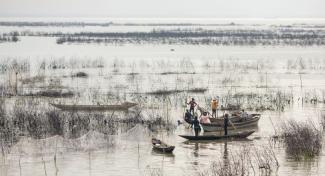Editorial
Particular urgency

Populations are growing, and so is population density, reducing the land available for agriculture. Pollution and resource depletion, moreover, result in the dwindling of fish stocks. Trawlers from many countries are contributing to overfishing. Traditional livelihoods are being eroded.
Coastal communities are exposed to specific risks. Storms and floods have always been dangerous, and global warming is now making extreme weather more frequent and more forceful. Because of flooding, fields become saline, reducing the scope for agriculture. Some farms are becoming unviable. An implication of the rising sea level, moreover, is that the ground water is affected too. Where it becomes too saline, it no longer quenches the thirst of humans and beasts.
Policymaker face major challenges. They must ensure that infrastructure – from roads to water and power supply – is improved and made resilient. Embankments must be fortified, dykes must be raised and protective vegetation must be planted. Storm shelters, early warning systems and disaster plans are needed.
These challenges do not only arise in rural areas. Many urban agglomerations are growing very fast, especially in Africa. Their transport systems, utilities, sanitation and waste management are overburdened. They need more and better health-care and education facilities. Decent jobs must be generated.
Rising to this multitude of challenges will require technical competence, sufficient funding and good governance. The big issues include fighting poverty, protecting the environment, stimulating the economy, building infrastructure and institutions. These are, of course, things that development agencies are familiar with – but the urgency to act is especially striking in coastal areas.
Industrialised countries must not shy away from their responsibility. This is not an issue of charity. The enlightened self-interest of advanced nations is to see other societies prosper in peace. Political stability is of global relevance, and trade with strong economies is much more profitable than trade with poor economies. Moreover, the rich countries have contributed most to causing climate change. They must not abandon the victims to their fate.
In international affairs, the term “climate refugee“ is not officially accepted yet. It should be. Migration from coastal areas is happening. Extreme heat, extended droughts, salinisation and other kinds of slow-onset change will make various areas in many world regions inhabitable.
The international community will have to deal with this problem. Preventive action makes sense. We need climate protection – and effective development cooperation. The better livelihoods are safeguarded and even improved in coastal regions, the fewer people will be forced to leave those regions.












